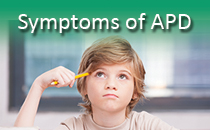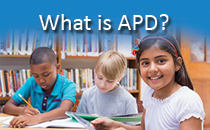
If auditory deficits aren’t identified and managed early, they can lead to speech and language delays and academic problems. Some of the more common symptoms seen in 3-5 year old children include sound sensitivities and difficulties discriminating between speech sounds, which is often reflected in their speech. In this age group, many of these characteristics are often misinterpreted as behavior problems, adjustment difficulties, and immaturity. Preschool children exhibiting several of the following symptoms should be monitored closely. For the child who does not auditorially process speech sounds with accuracy, pre-reading skills are extremely difficult to master, and the child can fall behind in academic progress. If symptoms persist as the child reaches school age, an APD evaluation should be performed.
Symptoms of APD in Preschool / Kindergarten Age Children
- Delayed speech and language abilities
- Confusion of similar sounding words (cap/cat)
- Articulation errors that are not consistent or that suggest acoustic confusions (such as substituting d for g)
- Difficulty following directions that other children the same age can follow easily (e.g. “Put your notebook away, and line up for recess.”)
- Highly distractible, especially in noisy situations
- Need to have directions repeated
- Need tactile or visual cues to attend when spoken to.
- Prefer puzzles or watching videos and television to listening to books.
- Seems to “tune out” others “daydream” or be “in a world of his/her own.”
- Difficulty staying focused on a person’s voice
- Difficulty sitting for story time
- Over sensitivity to sounds
- Difficulty learning new verbally presented concepts, instructions, or activities (may stare back with a blank face, wait and watch other children, or refuse to participate)
- Learns better through hands on activities when shown what to do, rather than being told what to do
- Has an easier time with “nonverbal” concepts such as matching colors and shapes
- Difficulty learning nursery rhymes
- May sing way off-tune or have a monotone voice
- May appear shy or keep to himself/herself to avoid talking with other children
- Poor phonological awareness skills such as sound discrimination, sound-symbol relationships, and identifying the beginning, middle, and ending sounds of words
- May avoid noisy situations such as loud parties and group play activities
- May like music but have difficulty learning the words to children’s songs. (i.e.. “The ABC’s, “Happy Birthday” or “Old MacDonald”)
- Prefer action games to listening to stories




